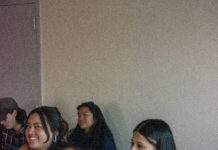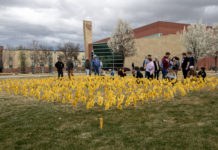by Ashlyn Gerbaz
For Colorado Mesa University student Sadaam Yousufzai, the recent immigration ban signed by President Donald Trump hits close to home. Even though he is from Toronto, Canada, he has family who cannot leave the U.S. because they might not be able to return.
“I have family in California, and they have visas to be here; they’re not citizens,” Yousufzai, who grew up Muslim, said. “But they can’t leave the country just because they’re not going to be able to get back in.”
On Jan. 27, Trump signed an executive order banning people from seven Muslim-majority countries: Yemen, Iraq, Iran, Libya, Somalia, Sudan and Syria. The citizens were denied entry into the U.S. for 90 days.
Yousufzai is not worried about being denied access to the U.S. since he is from Canada, but he believes the immigration ban could foreshadow Trump’s actions against any Muslims in the U.S.
“A lot of what I’m worried about is not the ban itself, but just like what’s gonna happen next,” Yousufzai said. “There’s this whole idea about this registration. Even my family, we’re not really worried about the ban, it doesn’t affect us, but a lot of people are affected by it.”
Many Muslims living in the U.S. can leave the country, but they might not be able to get back into the country after leaving.
“It’s kind of sad to see that just because you look at a country like America, which is known for diversity,” Yousufzai said.
According to CNN, just days after the order was signed protests broke out in at least eight major airports, including Orlando, Washington, Chicago and Atlanta.
In the first weekend of Trump’s order, over 100 people were detained at airports. The detainees range from people visiting, moving or returning to the U.S.
One of the people detained was Hameed Jhalid Darweesh, an Iraqi, who worked as a translator for the U.S. Military for many years.
After being released, Darweesh said in an interview with reporters. “America is the land of freedom, the land of rights — and I’m very thankful, and I’m very happy. Really, I forget what I faced and what happened to me. America is the greatest nation, the greatest people in the world.”
However, U.S. District Judge James Robart in Seattle issued a temporary restraining order halting the ban. Then, on Thursday, Feb. 9, a federal appeals court refused to reinstate the ban.
After the ruling, Trump tweeted, “SEE YOU IN COURT, THE SECURITY OF OUR NATION IS AT STAKE!”





